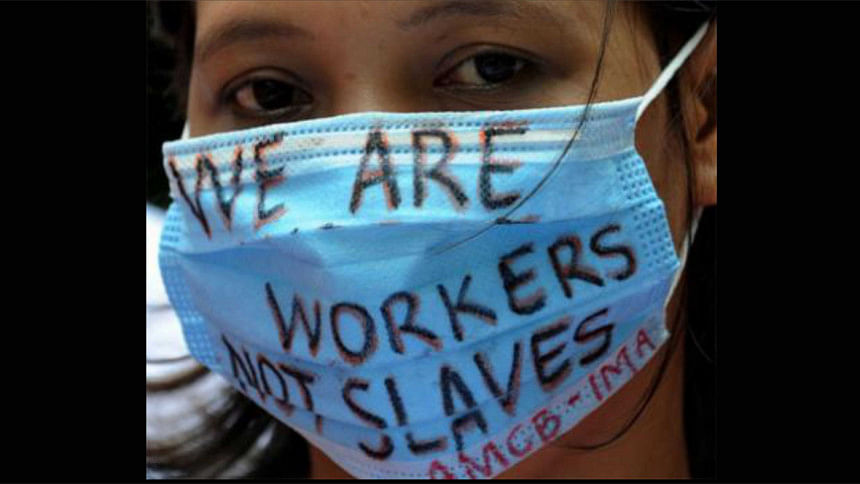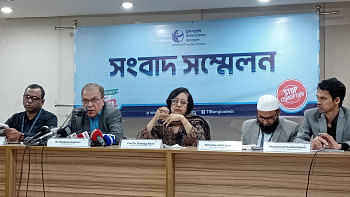Women working abroad: The sky is the limit

I was waiting for a taxi in front of the Dubai airport. Suddenly, I heard a woman taxi driver speaking in Bangla: "Have you come from Bangladesh? Where do you want to go?" We were completely dumbfounded. We could never have imagined meeting a woman taxi driver in Dubai, let alone a Bangladeshi one. I felt so proud and delighted that a Bangladeshi female migrant worker had been earning her livelihood driving a taxi in this desert city for a full decade. She had brought her whole family to Dubai. I saluted Husna Begum, the taxi driver. And then I wondered--do I have the capability to fight and survive like her?
Shilpi worked for me as a household help for about 5-6 years. She continued her studies while working under the Open University. Her manners, dexterity, attitude were always perfect and most of all, very professional. We were very happy with her and tried our best to make her feel at home. When I came to know about the recruitment of female workers for Hong Kong, through my colleague working on migration issues, I immediately decided to send Shilpi. I thought she would be an ideal candidate to work abroad where she would no doubt earn a better living.
Then came all the running around from one office to another to get the paperwork done--passport, medical clearance, training, Probashi Kallyan Bank, and the recruitment agency. Finally, we got everything in order and one fine day she flew off to Hong Kong. From then she struggled ahead on her own. She was in an unknown country living in an unfamiliar environment where everything was alien to her - the language, food, culture. Worst of all, she had no one she knew, no one she could share her worries with. But Shilpi overcame all of that. All on her own. We only gave her the moral support.
She came back after two years to renew her contract. Her salary is now about Tk 45,000, with food, lodging and visits back home provided for by the employer. She speaks English and Cantonese there, and is now dreaming of finding a chance to work in Europe. Even we cannot think of that! A simple Bangladeshi young woman striving and surviving in a completely unknown country all alone – Shilpi is truly inspiring. Kudos to Shilpi. I still wonder, would I be able to survive like this in an unknown land?
Husna Begum and Shilpi are successful migrant workers despite being female. Actually, willpower, confidence, the willingness to work hard and adapt to new environments, the sincerity to follow the proper procedures of work abroad, and a supportive environment from employers in Bangladesh enable many women to seek employment abroad and improve their future and that of their families. Shilpi's success has encouraged her sister Champa, and all her papers have been processed. Sultana, another sister, is next in line.
A report in the daily Samakal revealed that the total number of female migrant workers abroad crossed the 100,000 mark in 2015. It increased further in 2016. In fact, till November the figures for last year were already record-breaking, with more than 10 percent rise overall, without any special promotional or awareness campaigns on the opportunities of female migrants. The migration rates for women could be even higher with adequate government support. The government has not focused on this issue as much as they have on migration of male workers.
Unfortunately, the hurdles faced by female workers are just as plentiful as the opportunities. As a country, we started exploring the issue of female workers' migration quite late. The issue is compounded by our conservative and patriarchal society, lack of education, and family pressure and responsibilities. Women here do not find it as easy to leave their families behind to work overseas as men do. Even the expat welfare minister has concurred on that.
There are also frequent allegations of abuse and violence inflicted on many female household workers recruited in the Middle East. Many women have escaped back home to Bangladesh without asking for their earnings in fear of further abuse. This reduces the rate of female migration. What's more, a woman has to overcome a lot of other obstacles to finally become a migrant worker. She has to convince her guardians in the family, has to be at least minimally educated, arrange for child care if she is a mother, has to find training opportunities in the city, have ownership over necessary funds, find out about migration opportunities, and finally, have enough support to migrate with safety.
Often the most important issue is the societal disapproval of women going abroad for work which becomes the biggest bar for prospective women migrant workers. It is extremely difficult to ignore such kinds of pressure. When village girls or women move to the city to work in homes or garment factories, their families are often stigmatised by the community. The guardians also face problems finding grooms for their daughters.
The government is already working on some initiatives to increase the number of female migrant workers, and ensure their security there. It has started a helpline and help service to protect against abuse in their workplace. It has arranged for female workers to contact home free of cost. Many female workers are now going to the Middle East as Saudi Arabia has re-opened its labour market for us.
But now both the government and the recruitment agencies need to take more steps to utilise the opportunities. These include raising mass awareness on female worker migration; spreading information on the significantly lower costs of migration for women compared to men, e.g the cost of migrating to the Middle East is Tk 7-8 lakh for men, compared to just Tk 1.5 lakh for women; informing people on the accessibility of loans from the Probashi Kallyan Bank; making people understand that lower migrating costs means that women can contribute more to the family and the country; informing people about improved working conditions and security abroad; arranging for shelter, counselling, and healthcare for workers in distress, along with legal support and provision of compensation.
No woman should be sent to work abroad against her will or without proper training.
Apart from the Middle East, Asian countries like Singapore, Indonesia, Malaysia, and the Philippines are among the many countries which source female household workers. We need to explore the laws in these countries. We also must increase our presence in the Hong Kong labour market. For this we need both government and private initiatives to train our women workers. We can also try and explore possible opportunities in Europe and Australia.
We want the women of Bangladesh to go all over the world for work, like Husna Begum and Shilpi, and lead dignified, financially stable lives. It is not just education where girls and women can excel but in terms of their contribution to the economy through their skills and hard work. It gives me immense pleasure when I see a compatriot, whether man or woman, not only survive in unfamiliar shores but become financially solvent, uplifting their families from poverty through their courage, hard work and diligence. I salute all our migrant brothers and sisters. We remain indebted to you.

 For all latest news, follow The Daily Star's Google News channel.
For all latest news, follow The Daily Star's Google News channel. 



Comments